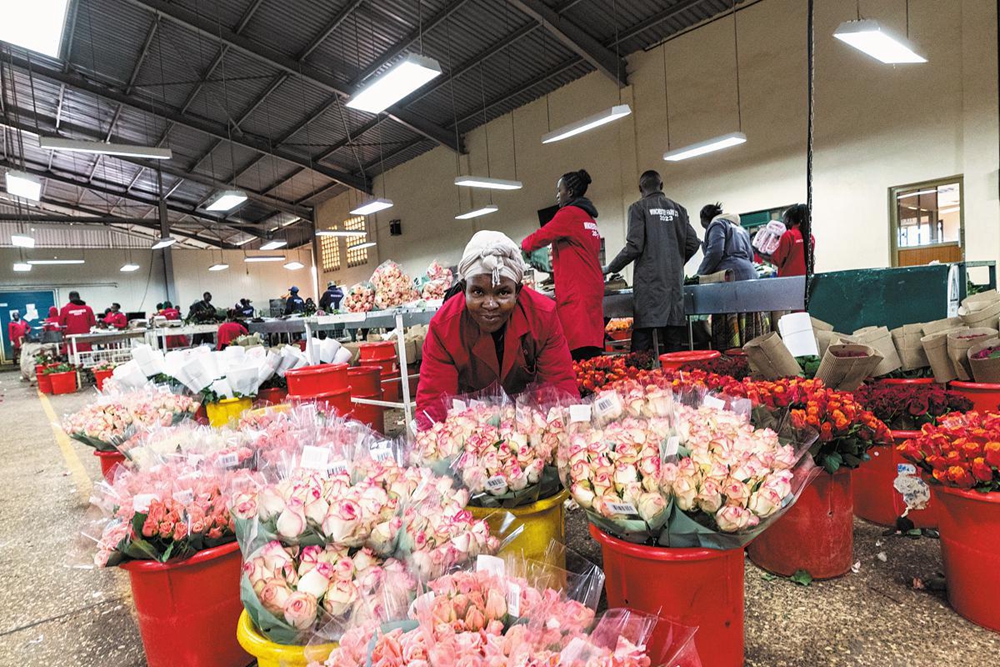Nation offers blooming prospects for Kenyan flowers
 Workers bouquet cut flowers at the Winchester Farm in Nakuru County on September 17, 2023. Express delivery and simplified customs procedures have shortened the arrival of Kenya flowers to Chinese market in 17 hours, instead of three days in the past. (Xie Songxin/China Daily)
Workers bouquet cut flowers at the Winchester Farm in Nakuru County on September 17, 2023. Express delivery and simplified customs procedures have shortened the arrival of Kenya flowers to Chinese market in 17 hours, instead of three days in the past. (Xie Songxin/China Daily)
The Winchester farm in Kenya's Nakuru County is the source of some of the most vibrant shades of roses from East Africa, ranging from scarlet red and vivid white to bright yellow bouquets.
The flowers can now reach the Chinese market in just 17 hours, compared with three days in the past, thanks to express air delivery and simplified customs inspections.
Kenya, which is Africa's largest exporter of flowers to China, exports a total of about 210,000 metric tons of flowers each year, according to the latest figures released by Kenyan authorities. It is the world's fourth-largest exporter of cut flowers.
The Winchester farm, run by Mzurrie Flowers, one of the more than 300 flower companies in Kenya, exported cut flowers worth $753 million last year.
Most exports have traditionally been to Western Europe. However, the entry of the Chinese market, which is growing by around 8 percent annually, has been a shot in the arm for the industry, according to the Kenyan Agricultural Ministry.
Gerald Kipkosgei, a technical specialist at the Winchester farm, said that various techniques are used to attain the high standards necessary for the flowers to be acceptable in markets such as China.
"We utilize technologies like drip irrigation, greenhouse ventilation systems and net shading during planting. After harvest, we employ precooling, cold storage facilities, grade, bouquet and fertilizer recycling systems to prevent wastage. We also use artificial lighting … and refrigerated trucks for our transportation," he said.
He added that the farm is currently eyeing further measures to increase the competitiveness of Kenyan flowers in the global market.
"We have moved into the space of value addition where we can finish the bouquets here, ready to go to the end buyer," Kipkosgei said.
Over the past decade, the cut flower industry has been thriving in Africa with the European Union offering the largest market for the continent's cut flowers. Kenya, Ethiopia and South Africa are the leading African nations in flower exports.
The growth of the Chinese market is promising to give Africa's floriculture a much-needed boost with its huge demand for the continent's flowers. An upturn in global flower production has pushed African countries to seek new markets, and China has recently emerged as a potential destination for high-value roses.
Previously, Kenyan flowers reached the Chinese market after passing through the Dutch flower auction, making them very expensive.
Clement Tulezi, chief executive officer of the Kenya Flower Council, said that Kenyan flower exporters plan to open a cut flower center in Beijing to deal with the Chinese market demand.
Tulezi said his organization was in the process of establishing the Asian Flower Association, which will be headquartered in Beijing and wholly owned by Kenyan exporters, who will be registered in the Chinese capital.
"I can confidently say that the Chinese market has proved to be lucrative for Kenyan flower farmers, and the rising demand in China for cut flowers may overtake our supply. The proposed association will deal with both supply and demand," he said.
"The Chinese market is growing faster than we can catch up. The new cut flower center will help satisfy the needs of our Chinese customers."
BRI boost
Under the framework of the China-proposed Belt and Road Initiative, Kenya's flower exports to China have been greatly boosted in the past decade. Kenya and China signed bilateral agreements in June last year to eliminate many trade barriers.
These included the scrapping of a number of tariffs and value-added tax, creating room for the flower trade to flourish. In addition, direct flights between Kenya's capital Nairobi and Changsha in Hunan province have increased to two per week since April.
"The floriculture industry is a huge employer and one of the biggest foreign exchange earners for Kenya. It has been tough in the past couple of years because of the cost of input and freight, and the cost-of-living crises here and in Europe, but the Kenyan floriculture industry is in a great place," Tulezi said.
With Kenya being the highest producer of cut flowers in Africa, access to the Chinese market is bound to bring good tidings for the continent's floriculture, as reflected in predictions by United States research company Mordor Intelligence.
According to the company's forecasts, the size of Kenya's floriculture market is expected to grow from $1.04 billion this year to $1.34 billion by 2028.
"Roses have the potential for expansion in Kenya's floriculture owing to reasons such as large production acreage, stable production throughout the year, and the fact that cultivators have established a high standard of procedures for producing high-quality roses. This should be boosted along with high demand from international markets," the report said.








